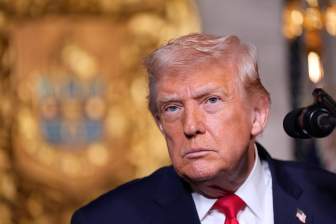Former Prime Minister Paul Martin was often described as a devout Catholic, but he says he doesn’t believe religion plays a great role in politics.

“The reason is quite simple, the country’s major religions are represented in all the major political parties,” Martin told Global News.
As part of a four-part series on faith in Canada, Global News spoke with Martin about how his religion influenced his time in politics.
READ MORE: Toronto mosque promotes gender equality, interfaith conversations
“But my decisions were based on what do I believe is the right thing for the country. I think that any political figure has to basically approach it in that way and that is the way that most political figures certainly in North America and I believe in Western Europe, have looked at it… I would not want, and nor would anyone else want, somebody of a particular faith to say ‘I’m going to govern for my faith and not for others.’”
The former Liberal leader served time in office from 2003 to 2006 and legalized same sex marriage in 2005.
READ MORE: Ontario church built in 1871, listed for $1
- Catholic priest in GTA charged with sex offences, removed from ministry: archdiocese
- Most Ontarians wait more than three months for specialist or diagnostic test: poll
- Some alcohol prices in Ontario could rise in the new year
- Toronto transit ridership sputters, failing to hit projections or 2024 totals
“When I did it, there was some controversy among some members of the clergy, but my parish priests, Father John Walsh, was asked about the question and what he said was that, fundamentally, when I asked question ‘would he give me communion’, he said, ‘absolutely. I believe the fundamental part of faith is that people love each other.’”

Get daily National news
Canada, Martin admits, is very different than the U.S. in how faith influences politics.
READ MORE: How Toronto’s C3 church is attracting millennials to Christianity
“We’re two very different countries and we approach things very differently,” Martin said.
“Religion plays a different role within the United States, at least within the Southern United States, as it does within the North East, but that’s just simply because of history.”
Laura Beth Bugg, assistant professor for the Study of Religion at the University of Toronto said the influence of religion in politics is different when Canada to U.S. and part of that is a result of the U.S. constitution.
“Canada doesn’t have an official separation of church and state—it doesn’t have an establishment clause in the Constitution in the same way that the U.S. does,” she said.
“It also doesn’t have the religious rite which I think is one of the biggest differences. So, the evangelical community in Canada — though it is growing, it is strong — it is not as significant…as it is in the United States and it is not as strong politically.”
Bug said immigration patterns have also had an effect on how religion is addressed in Canadian politics.
“What we’ve seen in Canada is that people expect religion to be a private matter. We’re okay with people being religious, as long as they don’t bring it up in public, and as long as they don’t let it really affect their decision making,” she said.









Comments